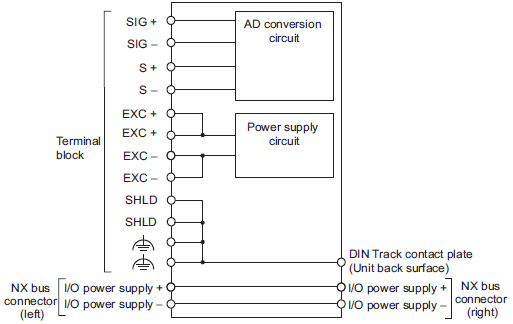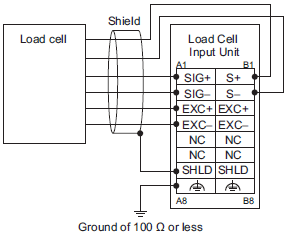Supported: Functions that are used in target applications
-: Functions that are not used in target applications
$ 625.04
| Product name |
Specification | Model | ||||
|---|---|---|---|---|---|---|
| Number of points |
Conversion cycle |
I/O refreshing method * |
Load cell excitation voltage |
Input range | ||
| Load Cell Input Unit |
1 | 125 μs | • Free-Run refreshing • Synchronous I/O refreshing • Task period prioritized refreshing |
5 VDC ± 10% | -5.0 to 5.0 mV/V |
NX-RS1201 |
* Refer to the I/O Refreshing in the NX-series Load Cell Input Unit User’s Manual (Cat. No. W565) for detailed information on I/O refresh cycle.
Note: The NX-RS1201-K Load Cell Input Unit with the test and calibration certificate is also available. Ask your OMRON representative for details.
| Item | Specification | |
|---|---|---|
| Enclosure | Mounted in a panel | |
| Grounding methods | Ground of 100 Ω or less | |
| Operating environment |
Ambient operating temperature |
0 to 55°C |
| Ambient operating humidity |
10 to 95% RH (with no icing or condensation) | |
| Atmosphere | Must be free from corrosive gases. | |
| Ambient storage temperature |
-25 to 70°C (with no icing or condensation) | |
| Altitude | 2,000 m max. | |
| Pollution degree | Pollution degree 2 or less: Meets IEC 61010-2-201. | |
| Noise immunity | Conforms to IEC 61000-4-4, 2 kV (power supply line) | |
| Overvoltage category |
Category II: Meets IEC 61010-2-201. | |
| EMC immunity level | Zone B | |
| Vibration resistance | Conforms to IEC 60068-2-6. 5 to 8.4 Hz with amplitude of 3.5 mm, 8.4 to 150 Hz, acceleration of 9.8 m/s2 100 min each in X, Y, and Z directions (10 sweeps of 10 min each = 100 min total) |
|
| Shock resistance | Conforms to IEC 60068-2-27, 147 m/s2, 3 times each in X, Y, and Z directions | |
| Applicable standards * | cULus: Listed (UL61010-2-201), ANSI/ISA 12.12.01, EU: EN 61131-2, NK, LR, RCM, KC: KC Registration |
|
* Ask your OMRON representative for the most recent applicable standards for each model.
Supported: Functions that are used in target applications
-: Functions that are not used in target applications
| Function | Application | Description | ||
|---|---|---|---|---|
| Weight measurement *1 |
Force measurement *2 |
|||
| I/O refreshing ethod setting *3 |
Supported. | Supported. | Sets Free-Run refreshing, synchronous I/O refreshing,*4 or task period prioritized refreshing*5 for the I/O refreshing*6 method. |
|
| Actual load calibration |
Supported. | Supported. | This is a user calibration function that is performed by placing an actual load on the load cell. |
|
| Equivalent input calibration |
Supported. | Supported. | This is a user calibration function that is performed by inputting the rated output, rated capacity, and zero balance values of the load cell. |
|
| Gravity acceleration correction |
Supported. | – | This function corrects errors in the gross weight values that occur due to the difference of gravity acceleration at each site when the site where the actual load calibration of the device is executed and the installation site are different. |
|
| Digital filtering | Supported. | Supported. | This function uses the digital filter to remove noise components that are contained in input signals to suppress fluctuations of measurement values. You can use the digital low-pass filter and moving average filter. |
|
| Zero set/ zero reset |
Supported. | Supported. | The zero set function corrects the gross weight value/force measurement value to be the zero point within the set range at a desired time. The zero reset function resets the zero point correction that is performed with the zero set function. |
|
| Zero tracking | Supported. | – | This function automatically corrects the zero point within the set range. |
|
| Zero point range over detection |
Supported. | Supported. | This function detects when the gross weight value/force measurement value exceeds the set zero point range. |
|
| Tare subtraction | Supported. | – | This function subtracts the tare weight value from the gross weight value to acquire the net weight value. There are two types of this function: one-touch tare subtraction and digital tare subtraction. |
|
| One-touch tare subtraction |
Supported. | – | This function stores the gross weight value at the specified timing as the tare value and subtracts it from a given gross weight value to acquire the net weight value. |
|
| Digital tare subtraction |
Supported. | – | This function subtracts the preset digital tare value from the gross weight value to acquire the net weight value. |
|
| Stable detection | Supported. | – | This function detects whether the gross weight value is stable. | |
| Over range/under range detection |
Supported. | Supported. | This function detects when the input signal exceeds the input conversion range. |
|
| Sensor disconnection test |
Supported. | Supported. | This function tests if the cable that connects the Load Cell Input Unit and load cell is disconnected. During the sensor disconnection test, you cannot measure the weight or force. |
|
| Input value refreshing stop |
Supported. | Supported. | This function stops refreshing the input value in a specified period. | |
| Peak hold/ bottom hold |
– | Supported. | This function continues holding the peak value or the bottom value of the force measurement value in a specified period. |
|
| Data tracing | Supported. | Supported. | This function records the values in REAL data in the buffer of the Load Cell Input Unit and exports the data to a CSV file. These values indicate the gross weight values/force measurement values before and after the digital filtering in a specified period. |
|
| Decimal point position setting |
Supported. | Supported. | This function sets the number of digits which is displayed after the decimal point for each DINT data. |
|
*1. It is used to measure the weight in the unit of kg or t.
*2. It is used to measure the force in the unit of N or kN.
*3. Select with the Communications Coupler Unit setting. Refer to the NX-series Load Cell Input Unit User’s Manual
(W565) for details on the setting method.
*4. You can select this option only when the Unit is used with an EtherCAT Coupler Unit with EtherCAT communications
in DC Mode.
*5. You can select this option only when the Unit is used with an EtherCAT Coupler Unit NX-ECC203 with EtherCAT
communications in DC Mode.
*6. This is the data exchange with the Controller.
| Unit name | Load Cell Input Unit | Model | NX-RS1201 | |
|---|---|---|---|---|
| Number of points | 1 point | External connection terminals |
Screwless clamping terminal block (16 terminals) |
|
| I/O refreshing method |
Free-Run refreshing, synchronous I/O refreshing, or task period prioritized refreshing | |||
| Indicators | TS indicator |
Input range | -5.0 to 5.0 mV/V | |
| Input conversion range |
-5.5 to 5.5 mV/V | |||
| Load cell excitation voltage |
5 VDC ± 10%, Output current: 60 mA max. |
|||
| Zero point adjustment range |
-5.0 to 5.0 mV/V | |||
| Gain point adjustment range |
-5.0 to 5.0 mV/V | |||
| Accuracy *1 |
Nonlinearity | ±0.01% (full scale) *2 | ||
| Zero drift | ±0.1 μV/°C RTI | |||
| Gain drift | ±10 ppm/°C | |||
| A/D converter resolution |
24 bits | |||
| Warm-up period | 30 minutes | Conversion cycle | 125 μs | |
| Dimensions | 12 (W) × 100 (H) × 71 (D) | Isolation method | Between the input and the NX bus: Power = Transformer, Signal = Digital isolator |
|
| Insulation resistance |
20 MΩ min. between isolated circuits (at 100 VDC) |
Dielectric strength | 510 VAC between isolated circuits for 1 minute at a leakage current of 5 mA max. |
|
| I/O power supply method |
No supply | Current capacity of I/O power supply terminal |
Without I/O power supply terminals | |
| NX Unit power consumption | • Connected to a CPU Unit 2.05 W max. • Connected to a Communications Coupler Unit 1.70 W max. |
Current consumption from I/O power supply |
No consumption | |
| Weight | 70 g max. | |||
| Circuit layout |  |
|||
| Installation orientation and restrictions |
Installation orientation: • Connected to a CPU Unit: Possible in upright installation. • Connected to a Communications Coupler Unit: Possible in 6 orientations. Restrictions: No restrictions |
|||
| Terminal connection diagram |
Diagram of the 6-wire connection between the Unit and a load cell.

Diagram of the 4-wire connection between the Unit and a load cell. |
|||
*1. Accuracy for when the load cell and the Load Cell Input Unit are connected with the 6-wire connection.
*2. The value for when the Load Cell Unit is used under the following conditions.
Full scale: 0.0 to 5.0 mV/V or -5.0 to 0.0 mV/V
Ambient temperature: 25°C
Setting of digital filtering: Default